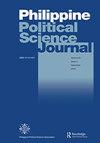菲律宾反ISIS战争中的认识论边界和交叉点
Q3 Social Sciences
引用次数: 0
摘要
遵循朱迪斯·巴特勒在《战争框架》中的方法:生活何时可以悲伤?在类似的理论视角下,本文考察了菲律宾南部打击ISIS的战争如何将“另一方”——战争的受害者——作为可有可无的“附带损害”。毫无疑问,一个受伊斯兰国启发的组织对马拉维城的围困对人类生命造成了可怕的损失,并暴露了该国日益容易受到恐怖主义的影响。然而,国家与媒体报道和政治评论中出现的流离失所受害者之间的关系,构成了一个认识论边界,将军队(作为国家的工具)塑造成无可争议的英雄实体,但同时又让流离失所的居民——主要是穆斯林少数民族——看不见,无法进入,在适当的时候是不可原谅的。媒体文本和评论,赋予国家观点和来源以特权,隐含地确立了什么是“可悲伤的”生活。一种特权霸权的观点使战争受害者失去了主体性,使他们的苦难和当地严重的人道主义状况没有问题。然后,本文探讨了这种新的认知取向是如何构建“脱敏”的政治话语的。尽管一些马拉维人的声音仍然浮出水面,但重点是获得公众对某一方的直接同情和认同,并对受害者产生道德冷漠。最后,本文以替代(和潜在的破坏性)话语的形式审视了认识论的交叉,尽管界限空间缩小了。它认为,在新意义的背景下,战争受害者保留了某种可能带来变革的机构形式,并可能重新成为可识别的声音,作为正式合作伙伴参与马拉维和穆斯林社区的集体恢复。本文章由计算机程序翻译,如有差异,请以英文原文为准。
Epistemological Borders and Crossings in the War against ISIS in the Philippines
Following the approach of Judith Butler in Frames of war: When is life grievable? and similar theoretical perspectives, the paper examines how the war against ISIS in Southern Philippines discursively represents the “other” – the victims of war – as dispensable “collateral damage”. There is no disputing that the siege of Marawi City by an ISIS- inspired group has taken a terrible toll on human life and has exposed the increasing vulnerability of the country to terrorism. Yet, the relation between the state and the displaced victims that emerged, brought forth in and through media reporting and political commentaries, constitutes an epistemological border that casts the military (as the state’s instrument) as the uncontested heroic entity, yet at the same time keeps the dislocated inhabitants – mostly Muslim minorities – out of sight, inaccessible, and in due course ungrievable. Media texts and commentaries, privileging state perspectives and sources, implicitly establish what counts as “grievable” lives. A privileged hegemonic perspective has kept the war victims de-subjectified, rendering their suffering and the grave humanitarian conditions on the ground unproblematic. The paper then looks into how a “desensitized” political discourse is structured by this new cognitive orientation. While some Marawi voices still surface, the focus is on gaining direct public empathy and identification toward a particular side and engendering moral indifference toward the victims. Lastly, the paper looks at epistemological crossings in the form of alternative (and potentially disruptive) discourses that have emerged, despite the narrowed liminal space. It argues that war victims, in a context of new meanings, retain some form of agency that might engender change, and could reemerge as recognizable voices who can participate as full partners in the collective restoration of Marawi and the Muslim community.
求助全文
通过发布文献求助,成功后即可免费获取论文全文。
去求助
来源期刊

Philippine Political Science Journal
Social Sciences-Political Science and International Relations
CiteScore
1.00
自引率
0.00%
发文量
17
期刊介绍:
The Philippine Political Science Journal (PPSJ) is an internationally refereed journal and the official publication of the Philippine Political Science Association (PPSA). The PPSJ welcomes articles dealing with the politics and international relations of Southeast Asia. Manuscripts may focus on individual countries of the region but comparative articles about the countries in the region and the region as a whole are especially welcome.
 求助内容:
求助内容: 应助结果提醒方式:
应助结果提醒方式:


